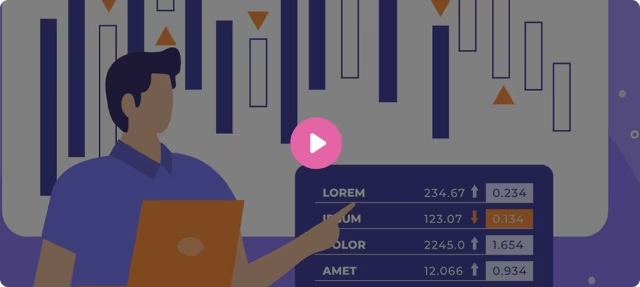 (1).png)

Stock Market vs Commodity Market
For investors in Pakistan, selecting the right market—equities or commodities—can significantly impact investment returns. The financial landscape has evolved rapidly, with online trading platforms making it easier than ever to invest in both the Pakistan Stock Exchange (PSX) and Pakistan Mercantile Exchange (PMEX). This chapter explores the differences between equity and commodity markets, their unique features, and how each can align with your investment goals.
What is the Stock Market?
In the equity market, investors buy shares of publicly listed companies such as Engro, Lucky Cement, or Habib Bank. These shares represent fractional ownership in the company. By holding these shares, investors gain certain rights—such as receiving dividends and voting in general meetings—and also benefit from capital appreciation if the share price rises.
To invest in equities in Pakistan, one must open a CDC (Central Depository Company) investor account through a licensed brokerage firm like Azee Securities, which facilitates access to PSX for online or offline trading.
The PSX allows investors to trade in shares, mutual funds, exchange-traded funds (ETFs), and equity derivatives (futures and options). The equity market is influenced by a broad range of factors such as:
- Company earnings reports
- Macroeconomic indicators (interest rates, inflation)
- Policy decisions from the State Bank of Pakistan (SBP)
- Geopolitical developments
- Investor sentiment
Equity markets are often ideal for long-term investment strategies, enabling wealth generation through capital gains and dividends.
What is the Commodity Market?
The commodity market facilitates the buying and selling of physical goods or raw materials such as gold, silver, oil, wheat, sugar, and cotton. In Pakistan, this market is regulated and operated through PMEX, which offers trading primarily in commodity futures contracts.
Unlike stocks, commodities represent no ownership stake. Instead, investors speculate on future price movements of these assets. For example, a trader might enter a gold futures contract, expecting prices to rise in the next few weeks.
At PMEX, you can trade in commodities like:
- Precious metals (Gold, Silver)
- Energy (Crude Oil)
- Agricultural commodities (Rice, Sugar)
- Currencies (USD/PKR Futures)
- Index derivatives (KSE-30 Futures)
Commodity trading is driven by supply and demand, seasonal factors, weather conditions, global events, and geopolitical risks, which makes it more volatile than equity trading.
Key Differences in Pakistan
Stock Market vs. Commodity Market
| Feature | Stock Market (PSX) | Commodity Market (PMEX) |
|---|---|---|
| Underlying Asset | Shares of listed companies | Physical commodities |
| Ownership | Yes – Shareholder of a company | No – Speculative or hedging contracts |
| Trading Method | Buy/sell in cash or futures | Primarily futures contracts |
| Volatility | Moderate, linked to fundamentals | High, driven by global supply-demand |
| Investment Horizon | Long-term ideal | Short to medium term |
| Trading Hours | 9:30 AM – 3:30 PM | Extended hours (22+ hours/day) |
| Liquidity | High in blue-chip stocks | Varies across commodities |
| Margins | Higher | Lower, offering greater leverage but higher risk |
| Returns | Capital appreciation + dividends | Price movement gains only |
| Key Influencers | Earnings, news, SBP policies | Global events, weather, geopolitical risk |
Common Factors Affecting Both Markets
- Interest Rates: A change in SBP’s policy rate can impact both stock valuations and commodity prices.
- Inflation: While inflation may erode equity returns, it often boosts commodity prices.
- Global Market Sentiment: Both markets respond to global cues such as oil prices, currency movement, and geopolitical events.
- Rupee Devaluation: Can benefit exporters on PSX and boost commodity prices, especially for dollar-denominated contracts like gold.
Which One is Better for You?
The choice between equity and commodity markets depends on:
- Risk Appetite: Commodity markets are more volatile and better suited to risk-tolerant traders.
- Time Horizon: Equities are more suited for long-term growth; commodities cater more to short-term trades and speculation.
- Investment Objectives: Want ownership and dividends? Go for equities. Want to hedge or speculate on price movement? Commodities might suit you.
A balanced investor can diversify across both markets—using equities for long-term capital building and commodities for short-term tactical plays.
Things to Consider Before Choosing Between Equities and Commodities
- Market Knowledge: Commodity trading requires strong understanding of global trends and technical indicators. Equities rely more on company analysis.
- Trading Skills: Commodity trading demands active monitoring due to price volatility. Equity investors can adopt a passive or active strategy.
- Technology Access: Both PSX and PMEX are accessible via advanced trading platforms such as MetaTrader 5 (MT5) for commodities and Azee’s web/mobile platforms for equities.
- Regulatory Compliance: Ensure your broker is registered with SECP and offers proper investor protection mechanisms.
Quick Recap:
- Equities offer ownership in companies and generate returns through dividends and price appreciation.
- Commodities are real-world assets like gold, oil, and wheat, traded for speculation or hedging through futures contracts.
- PSX operates in a structured equity environment; PMEX handles commodity trading under futures-based mechanisms.
- Equity trading is ideal for long-term investors; commodities are better suited to short-term, high-risk strategies.
- Equity prices are driven by company and economic fundamentals; commodity prices are impacted by supply-demand, weather, and geopolitics.
- Commodities offer higher leverage but come with greater volatility.
- New investors may find commodities simpler to analyze (based on macro factors), while equities require detailed company analysis.
- Consider your risk tolerance, goals, and market knowledge before choosing between the two—or use both for a diversified strategy.
Get Started with Azee Securities
Ready to start your investment journey with Azee Securities? Open a Stock Trading Account and gain access to the Pakistan Mercantile Exchange (PMEX). Let Azee Securities help you make informed decisions. Our expert advisors, advanced trading platform, and real-time market data ensure you stay ahead of the curve.
Azee Securities Limited
Member Pakistan Stock Exchange | PMEX | NCCPL | CDC
SECP Registered & Regulated